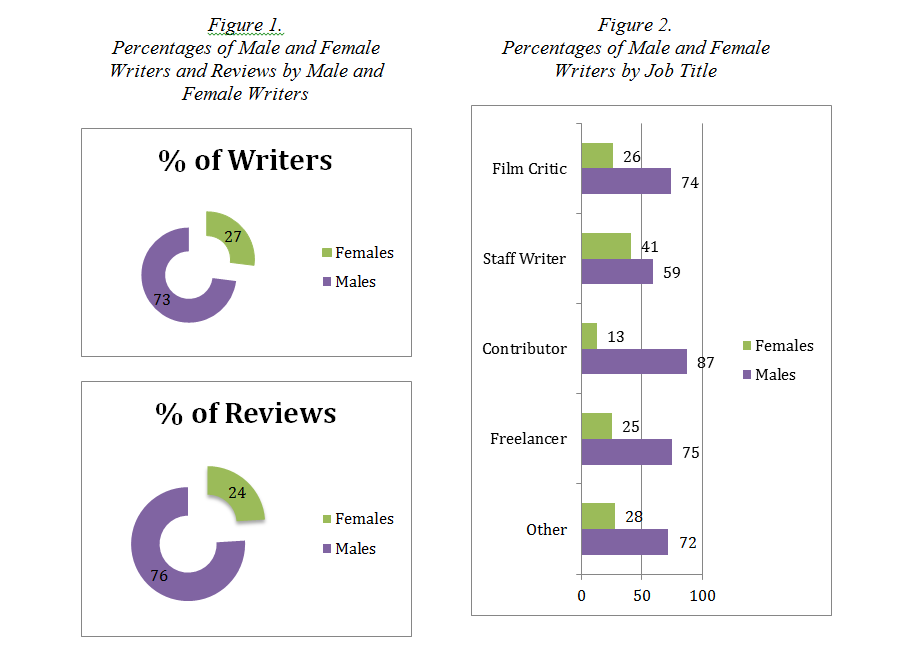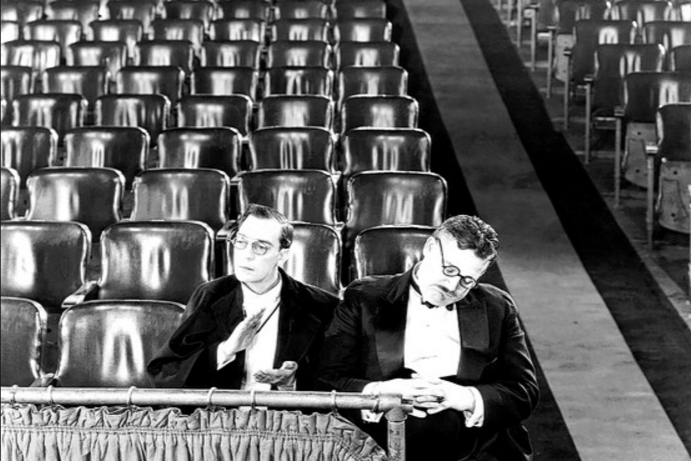When we here at Women and Hollywood published The Dudeocracy of Film Writers, we were basing our theory on observations of the film writing industry, and what we saw going on around us. But now, thanks to Dr. Martha Lauzen, we have the numbers and research to back up our hypothesis. The film writing world is seriously lacking in female voices, and one of the most popular sites on the web where consumers go to find film writing and reviews, Rotten Tomatoes, features very few women in its “top critics” section.
Dr. Lauzen and the Center for the Study of Women in Television & Film at San Diego State University have released a new study called “Thumbs Down 2016: Top Film Critics and Gender.” Similar to 2013’s “Gender @ the Movies: Online Film Critics and Criticism,” the study explores female film writers in hard numbers.
As the study’s description details, the research “considers the representation of women and men as ‘top critics’ on the film review aggregator site, Rotten Tomatoes. As these film writers work for the largest newspapers, general interest magazines and websites, and entertainment trade publications in the U.S., their reviews reach the greatest numbers of viewers, listeners, and readers.”
The study was conducted over a three-month period this spring, and compared the percentages of female and male writers, their job titles, publications they write for, membership in professional organizations, and their film ratings. 5,776 reviews written by 247 “top critics” were considered. In order to be labelled a “top critic,” Rotten Tomatoes says one must “be published at a print publication in the top 10 percent of circulation, employed as a film critic at a national broadcast outlet for no less than five years, or employed as a film critic for an editorial-based website with over 1.5 million monthly unique visitors for a minimum of three years. A top critic may also be recognized as such based on their influence, reach, reputation, and/or quality of writing, as determined by Rotten Tomatoes staff.”
One of the most prominent findings was the very topic that we addressed in the Dudeocracy piece: that men outnumbered women in every job title category considered. Men comprised 87 percent of contributors, 75 percent of freelancers, 74 percent of film critics, 72 percent of individuals with other titles (e.g., television critics, features editors, etc.), and 59 percent of staff writers.

Additionally, men accounted for 80 percent of writers at trade publications such as The Hollywood Reporter, The Wrap, and Variety, 78 percent of writers working for multiple publications, 76 percent of those writing for “general interest magazines and websites” such as Time and Salon, 74 percent of individuals writing for movie/entertainment magazines and websites, and 71 percent of those writing for newspapers.
When it came to film reviews, the study found that men wrote more reviews than women throughout all film genres. The greatest discrepancy between male and female writers occurred for science fiction features. Men penned 84 percent and women 16 percent of reviews in the genre. But the numbers weren’t swapped when it came to, say, romantic comedies: men still wrote 57 percent and women 43 percent of these reviews. As the study suggests, “It is unclear whether women prefer and thus choose to review films in certain genres or if editors tend to assign films in certain genres to women.”
Though the figures are dismal, female critics are increasing in number. Women made up only 27 percent of “top critics” with reviews appearing on Rotten Tomatoes in spring 2016. However, this represents an increase of 5 percentage points from 2013 when women accounted for 22 percent of top critics. And while women wrote only 24 percent of the reviews by “top critics,” it represents an increase of 6 percentage points from 2013 when women wrote 18 percent of reviews.
These facts and figures are certainly disappointing, but not very surprising. The next step, then, is to work just as hard to get women into positions of film criticism, film writing, TV criticism, and all around entertainment writing just as hard as we fight for women within the entertainment industry. What women achieve in Hollywood may not be as noted or celebrated if we don’t have women writing about it in the press.
You can read some of the study’s major findings below. For the entire report, head here.
- The vast majority of “top critics” on the Rotten Tomatoes website are men. In spring 2016, women comprised just 27 percent and men 73 percent of these individuals.
- Regardless of job title, male writers outnumber female writers. Men accounted for 74 percent and women 26 percent of individuals working as film critics for media outlets. Men comprised 75 percent and women 25 percent of freelancers.
- In every type of publication, male reviewers dramatically outnumber female reviewers. For example, males comprised 80 percent and females 20 percent of individuals writing about film for trade publications. Men accounted for 71 percent and women 29 percent of those writing about film for large U.S. newspapers.
- Male writers are more likely than female writers to belong to at least one professional critics organization. 54 percent of male reviewers and 37 percent of female reviewers belong to one or more professional organizations, such as the National Society of Film Critics or the Los Angeles Film Critics Association.
- Men write more reviews of films in all genres than women. The greatest discrepancy between male and female writers occurred for science fiction features. In spring 2016, men penned 84 percent and women 16 percent of reviews in this genre. The greatest parity occurred on romantic comedies and dramas. In this genre, men wrote 57 percent and women 43 percent of reviews.
- A larger proportion of the films reviewed by women than by men feature female protagonists. 34 percent of reviews written by women but 24 percent of reviews written by men featured female protagonists. Conversely, a higher proportion of the reviews written by men than by women had male protagonists exclusively. 76 percent of reviews written by men but 66 percent of reviews written by women featured male protagonists only. It is unclear whether these differences are due to the preferences of writers or assignments made by editors.
- On average, male and female reviewers do not differ in the quantitative ratings they award films featuring female protagonists, whether the ratings are expressed as stars, reels, grades, or some percentage score. In spring 2016, female writers awarded an average rating of 66 percent to films with female protagonists. Male writers also awarded these films a rating of 66 percent. However, male and female writers differed slightly in their ratings of films featuring male protagonists only. Female writers awarded these films an average rating of 69 percent whereas male critics gave the films an average rating of 65 percent.







